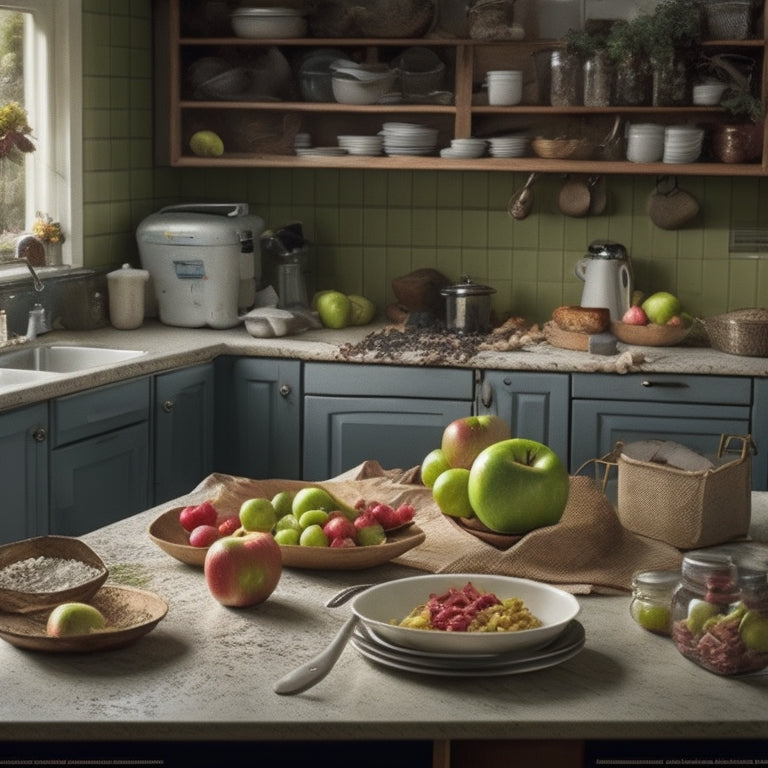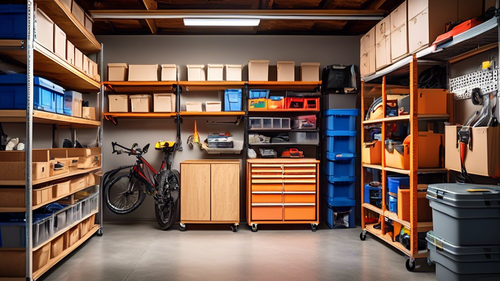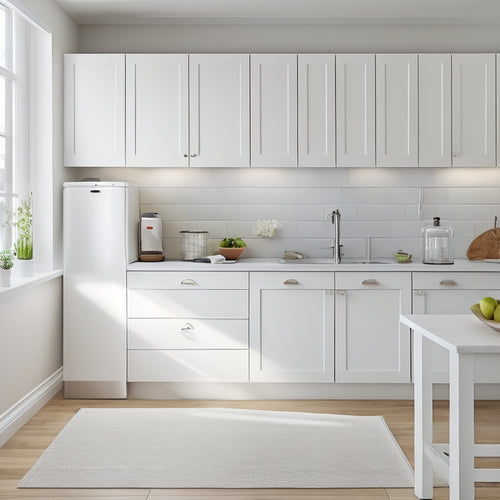
Why a Cluttered Kitchen Hinders Healthy Eating
Share
You're more likely to compromise on your healthy eating goals when your kitchen is cluttered, as the stress and anxiety triggered by a disorganized space can drive you to rely on convenience foods and overeating. Cluttered kitchens make it hard to store ingredients, prep meals, and lead to food waste. You'll find yourself opting for last-minute takeout or sacrificing meal prep time due to cramped storage areas. In a cluttered kitchen, cooking time increases, and unhealthy options become more accessible. By understanding the impact of clutter on your eating habits, you'll uncover the key to creating a kitchen environment that supports your healthy eating goals.
Key Takeaways
• A cluttered kitchen environment exacerbates stress and anxiety, leading to overeating and reliance on convenience foods.
• Limited storage space and disorganization hinder meal planning, causing people to opt for last-minute takeout instead of cooking.
• Clutter leads to overlooked expiring or spoiled food, resulting in duplicated purchases, unnecessary waste, and negatively impacting healthy eating efforts.
• Cluttered kitchens decrease cooking efficiency, increasing time spent searching for ingredients and tools, and making unhealthy options more accessible.
• An organized kitchen, on the other hand, promotes healthy eating habits by providing easy access to healthy ingredients, reducing food waste, and increasing the likelihood of cooking at home.
Cluttered Kitchen Affects Mental Health
A cluttered kitchen environment can greatly worsen stress and anxiety levels, making it challenging for you to focus on meal preparation and healthy eating habits.
When you're surrounded by clutter, it can be easy to feel overwhelmed, which can lead to unhealthy coping mechanisms like overeating or reaching for convenience foods. This, in turn, can worsen stress and anxiety, creating a vicious cycle.
To break free from this cycle, establishing a stress-relieving kitchen environment is crucial.
Begin by decluttering and organizing your space, which can help clear your mind and promote a sense of calm. This will enable you to concentrate on mindful eating, relishing each bite, and enjoying the process of cooking and sharing meals with others.
By doing so, you'll be better prepared to make healthier choices, reducing your stress levels and enhancing overall well-being.
Limited Space Impacts Meal Planning
When you're working with a cluttered kitchen, you're likely struggling to find space to store ingredients and prep meals.
This limited space impacts your ability to plan healthy meals, making it harder to keep track of what you have on hand and what you need to buy.
As a result, you may find yourself relying on last-minute takeout or fast food instead of cooking nutritious meals.
Cramped Storage Areas
Limited kitchen storage areas, like cramped pantries and cluttered countertops, force you to sacrifice meal planning and healthy eating goals, as they make it difficult to stock and organize nutritious ingredients. When you can't find a place to store healthy staples, you're more likely to resort to convenient, processed foods that hinder your wellness goals.
| Storage Area | Challenge | Solution |
|---|---|---|
| Pantry | Cluttered shelves, expired food | Implement pantry organization systems, like baskets and labels |
| Countertop | Cluttered surfaces, limited prep space | Designate a "landing strip" for daily essentials, and utilize vertical storage |
| Cabinets | Hard-to-reach shelves, disorganized contents | Install pull-out shelves and dividers to maximize accessibility |
| Fridge | Overcrowded shelves, expired food | Purge expired items, and organize contents by category and expiration date |
| Freezer | Disorganized frozen meals, hard-to-find items | Label and categorize frozen meals, and store them in airtight containers |
Meal Prep Challenges
With a cluttered kitchen, you're forced to sacrifice meal prep time, as every available inch of counter space is already occupied by appliances, ingredients, or cooking utensils, leaving you little room to chop, dice, or marinate. This limited space impacts your meal planning, making it difficult to manage your time efficiently. You struggle to find a spot to organize your ingredients, utensils, and cooking stations, leading to frustration and wasted time.
As a result, you're more likely to rely on quick, unhealthy meals or takeout, rather than investing time in cooking techniques that promote healthy eating. In addition, the lack of space hinders your ability to find recipe inspiration, making meal planning a challenging task. You can't even think about grocery shopping, as you're not sure what ingredients you need or have space to store.
Effective time management is key to healthy eating, but a cluttered kitchen makes it impossible to prioritize meal prep. By decluttering your kitchen, you can reclaim your space, and your health.
Disorganization Leads to Food Waste
A cluttered kitchen layout and inadequate storage systems cause you to overlook expiring or spoiled food, leading to unnecessary waste. This disorganization not only affects your wallet but also your efforts to maintain a healthy diet. When you can't see what you have, you're more likely to buy duplicates or let food go to waste.
Here are some common scenarios that may resonate with you:
-
Forgotten leftovers: You cook a meal, store it in a container, and forget about it until it's too late.
-
Expired ingredients: You buy a spice or condiment, only to find it expired or spoiled when you need it.
-
Overripe produce: Fresh fruits and vegetables go bad because you can't find them amidst the clutter.
- Duplicated purchases: You buy something you already have, simply because you can't find it in your kitchen.
Clutter Slows Down Cooking Time
You'll likely spend more time searching for ingredients and cooking tools in a cluttered kitchen, slowing down your cooking time and making meal prep a frustrating experience. This is because cluttered kitchens lead to poor time management, causing you to waste precious minutes searching for misplaced items. As a result, you'll struggle to cook efficiently, and your meals will suffer.
| Task | Cluttered Kitchen | Organized Kitchen |
|---|---|---|
| Finding ingredients | 5-10 minutes | 1-2 minutes |
| Preparing meals | 30-45 minutes | 20-30 minutes |
| Cleaning up | 20-30 minutes | 10-20 minutes |
| Total cooking time | 55-85 minutes | 31-52 minutes |
Unhealthy Options Become Convenient
When your kitchen is cluttered, you're more likely to reach for unhealthy options because they're readily available.
You'll find yourself grabbing that bag of chips or ordering takeout because it's easier than maneuvering through the mess to prepare a healthy meal.
As a result, junk food and fast food become your go-to choices, ultimately hindering your efforts to eat healthy.
Easy Access to Junk
Junk food vendors strategically place their products at eye-level in your kitchen, making unhealthy options temptingly convenient. You're more likely to reach for that bag of chips or box of cookies when they're staring you right in the face. This convenience can be a significant obstacle to healthy eating, as it creates hidden temptations that undermine your best intentions.
Here are some common culprits that might be lurking in your kitchen:
-
Sugary snacks: Colorful packaging and catchy slogans make it hard to resist the allure of candy, cookies, and other treats.
-
Frozen meals: Convenient, but often high in sodium, preservatives, and unhealthy fats.
-
Processed meats: Hot dogs, sausages, and bacon might be easy to grab and go, but they're loaded with saturated fats and sodium.
- Beverages with added sugars: Soda, sports drinks, and sweet tea might quench your thirst, but they're major contributors to sugar intake.
Fast Food Within Reach
Having fast food delivery numbers or apps on speed dial can turn unhealthy options into convenient fallbacks, making it all too easy to sacrifice nutrition for speed. You're just a click away from a greasy pizza or a bucket of fried chicken, and before you know it, you've devoured an entire meal that's high in calories and low in nutrients.
When you're short on time, it's tempting to rely on convenience foods that are quick to prepare but detrimental to your health. Unhealthy snacks like chips, cookies, and candy are also just an arm's length away, waiting to sabotage your diet. By keeping these options within easy reach, you're setting yourself up for a pattern of unhealthy eating.
It's time to reassess your priorities and make a conscious effort to surround yourself with healthy choices. Take control of your kitchen and your diet by eliminating the temptation of unhealthy options and replacing them with nutritious alternatives.
Organization Boosts Healthy Habits
By streamlining your kitchen space, you create an environment that supports healthy eating habits and encourages you to make better food choices. A well-organized kitchen layout and effective storage solutions can boost your motivation to cook healthy meals and reduce reliance on processed foods.
Here are some benefits you can expect from an organized kitchen:
-
Easy access to healthy ingredients: Fresh fruits and vegetables are within reach, making it easier to incorporate them into your meals.
-
Clear countertops: No more cluttered surfaces, allowing you to focus on meal prep without distractions.
-
Efficient meal planning: With a clear view of your kitchen, you can plan and prepare healthy meals in advance.
- Reduced food waste: You'll be more likely to use up leftovers and avoid expired food when you can see what you have in stock.
Frequently Asked Questions
How Do I Declutter My Kitchen Without Throwing Away Essential Items?
You'll declutter your kitchen without ditching essentials by implementing organizing tips, categorizing items, and using decluttering strategies; prioritize essential kitchen appliances and utensils, then allocate storage space for each group, ensuring a functional and efficient kitchen.
Can a Cluttered Kitchen Affect My Cooking Skills and Confidence?
You're a culinary mastermind in a tidy space, whipping up feasts with ease, but in a cluttered kitchen, you're a stressed-out mess, struggling to find ingredients - organization skills boost confidence, while chaos stifles cooking creativity and stress reduction.
Are There Any Specific Kitchen Areas That Need More Attention to Decluttering?
You'll want to focus on pantry organization, refrigerator maintenance, and tackling countertop clutter to create a more efficient space. Don't forget to organize your drawers, ensuring everything has its designated spot, making meal prep a breeze.
How Often Should I Clean and Declutter My Kitchen to Maintain Organization?
You should maintain your kitchen's organization by dedicating time to weekly organization tasks and scheduling a monthly deep clean. Implement decluttering strategies and optimize storage solutions to keep your kitchen clutter-free and functional.
Can a Cluttered Kitchen Increase My Risk of Foodborne Illnesses?
You increase your risk of foodborne illnesses when you tolerate a cluttered kitchen, compromising food safety through poor organization, inadequate kitchen hygiene, and reduced cleanliness, making it easier for bacteria to spread and contaminate your food.
Related Posts
-

Garage Roof Storage: Options and Considerations
The Unseen Space Saver As a homeowner, I've always faced the dilemma of finding ample storage space without clutte...
-

What Makes a Perfectly Functional Home Layout?
You're on a mission to create a perfectly functional home layout, where every inch works in harmony to enhance your d...
-

10 Creative Cabinet Solutions for a Clutter-Free Kitchen
You're tired of cluttered kitchen cabinets making meal prep a hassle. Change your kitchen with 10 creative cabinet so...


